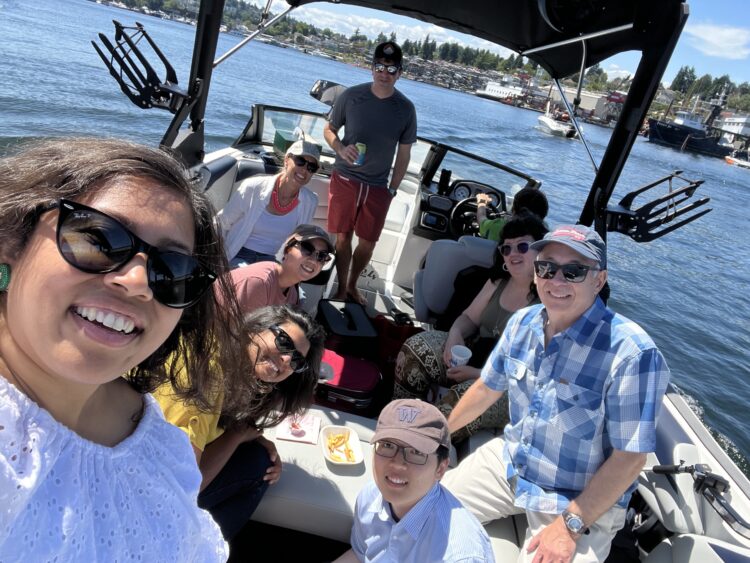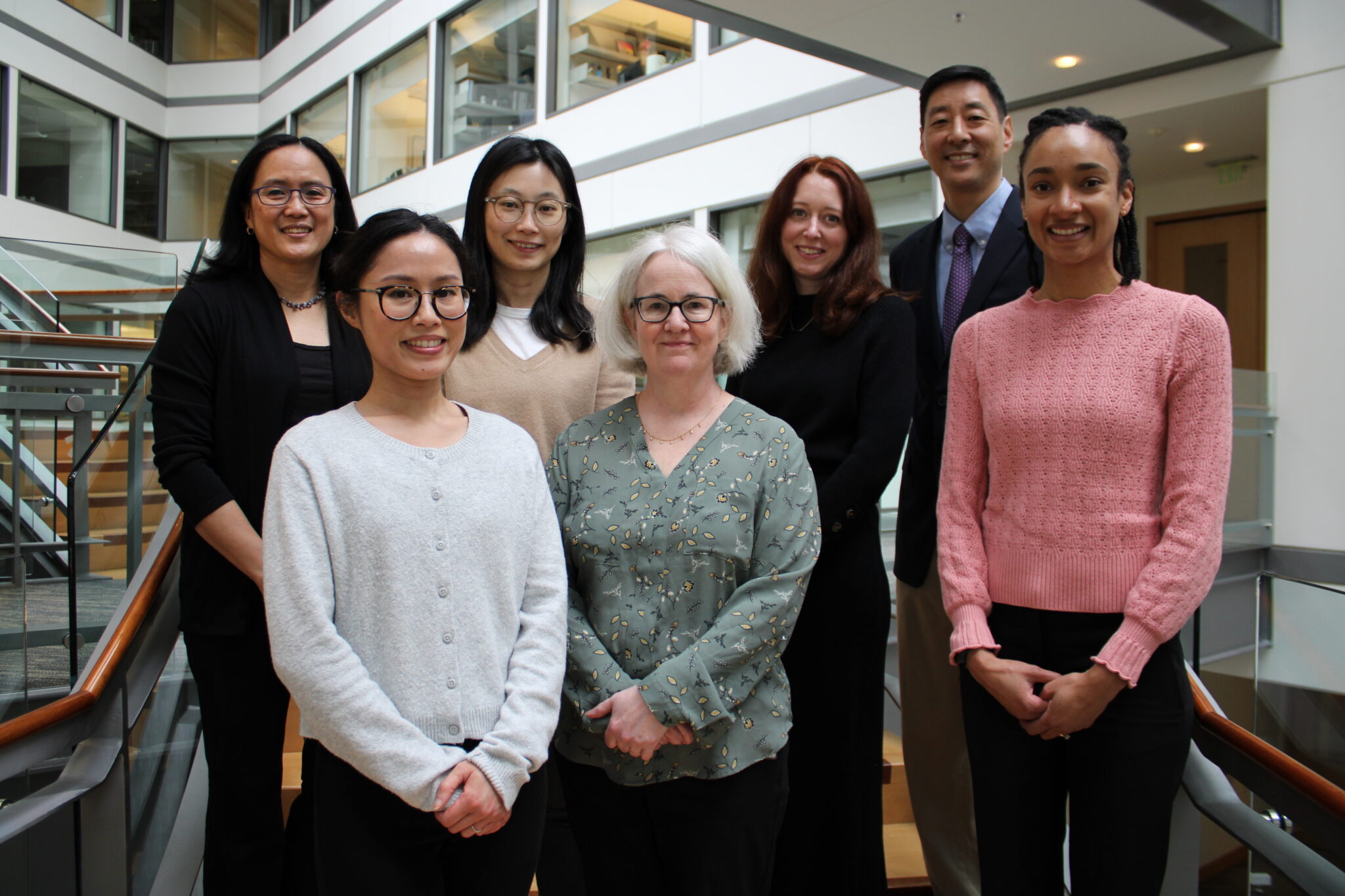Research
Original, evidence-based research is a signature of the UW Breast Imaging group. Our faculty, fellows, residents, and research staff collaborate with each other and with external colleagues to study new imaging technologies, cost-effectiveness in health care, global health issues, and improving access to breast care for underserved populations. Our faculty members are recipients of prestigious scientific awards from the National Institutes of Health (NIH), Radiological Society of North America (RSNA), American Roentgen Ray Society (ARRS), Association of University Radiologists (AUR), American College of Radiology Imaging Network (ACRIN), and the American Cancer Society (ACS), among others.
For questions about our research or open studies, contact b-imaging-research@seattlecca.org.
Research Labs
- Quantitative Breast Imaging Lab. The QBI lab brings together a world class team of physicians and scientists to investigate new imaging techniques and to develop robust quantitative imaging biomarkers. http://depts.washington.edu/breastmr/

QBI Lab: Debosmita Biswas, Anum Kazerouni, Isabella Li, Savannah Partridge, Ph.D., Habib Rahbar, M.D., Mary Lynn Bryant, Mike Hirano, Wesley Surento.
- Northwest Screening and Cancer Outcomes Research Enterprise (NW-SCORE). NW-SCORE is a unique partnership between the University of Washington and regional health systems in the Pacific Northwest to aggregate de-identified breast imaging data with the goal of conducting innovative research studies that will inform policies and practices, and improve population-based screening outcomes. http://depts.washington.edu/cascreen/

Janie Lee, MD, Mary Grace Asirot, Yingke Xu, Suzanne Kolb, Kathryn Lowry, MD, Christoph Lee, MD, Marissa Lawson, MD
Active Studies
- Multicenter Quantitative MRI Assessment of Breast Cancer Therapy Response. The goal of this observational study is to investigate and validate multi-parametric magnetic resonance imaging (MRI) modalities for assessment of breast cancer response to neoadjuvant chemotherapy in a multi-site and multi-MRI scanner platform setting. This study is conducted at Oregon Health & Science University (OHSU), University of Washington (UW), and University of Iowa (UI) using Siemens, Philips, and General Electric MRI scanners, respectively. For more information, visit https://clinicaltrials.gov/study/NCT05704062
- Gadopiclenol to Increase Accuracy for Local Staging of Challenging Breast Cancers: Invasive Lobular Carcinoma and Ductal Carcinoma In Situ. The goal of this study is to improve the accuracy of breast magnetic resonance imaging (MRI) for staging and evaluation of invasive lobular carcinoma (ILC) and ductal carcinoma in situ (DCIS) using a novel high-relaxivity contrast agent (gadopiclenol) along with an advanced MRI acquisition approach.
Closed Studies
- MRI Characterization of Mammographically detected Calcifications and Ductal Carcinoma in Situ. The goal of this study is to determine whether quantitative, multiparametric breast MRI performed prior to biopsy can identify and biologically characterize ductal carcinoma in situ (DCIS) to provide an accurate, non-invasive biological risk assessment of DCIS lesions. For more information, visit https://clinicaltrials.gov/ct2/show/NCT03495011
- Non-Contrast DWI for Supplemental Screening. This study aims to optimize non-contrast diffusion weighted MRI (DWI) image quality and test the performance of DWI to detect clinically and mammographically occult breast cancer in women with dense breast tissue. For more information, visit https://clinicaltrials.gov/ct2/show/NCT03607552
- Functional MRI Signatures of Immune Response to Targeted Breast Cancer Therapy. The goal of this research is to improve breast cancer treatment by identifying novel imaging markers of tumor immune response. Exciting advances in immunotherapeutic treatment approaches increase the need for new tools to quantify response and assess treatment efficacy in vivo.
- Advanced Methods for Breast Cancer Screening – CESM (contrast-enhanced spectral mammography) and ABMR (abbreviated breast MRI). The purpose of this study is to learn if two new breast cancer screening tests are effective in detecting breast cancer. If these tests provide similar performance to standard breast MRI, they may offer additional screening options at lower cost for more women. For more information, visit https://clinicaltrials.gov/ct2/show/NCT03517813
- Abbreviated Breast MRI and Digital Tomosynthesis Mammography in Screening Women with Dense Breasts. This trial, led by the ECOG-ACRIN Cancer Research Group, will study how well abbreviated breast magnetic resonance imaging (ABMR) and digital tomosynthesis mammography (also called 3D mammography) work in detecting cancer in women with dense breasts. Combined screening with abbreviated breast MRI and digital tomosynthesis mammography may be an effective method to screen women with dense breasts. This trial is currently in the follow-up phase and is no longer recruiting patients. For more information, visit https://clinicaltrials.gov/ct2/show/NCT02933489
- Magnetic Resonance Imaging (MRI) and Multiparameter Gene Expression Assay in Ductal Carcinoma In Situ (DCIS). This trial, led by the ECOG-ACRIN Cancer Research Group, combines advanced imaging (breast MRI) and a gene expression assay (OncotypeDX DCIS score) to facilitate individualized therapies for women newly diagnosed with ductal carcinoma in situ (DCIS). This is important because it is increasingly recognized that DCIS accounts for a large proportion of breast cancers that would not impact a woman’s health if not identified, resulting in overtreatment of many women with unnecessary radiation therapy. For more information, visit https://clinicaltrials.gov/ct2/show/NCT02352883
- STAR Study. This study is investigating whether automated whole breast ultrasound can improve detection of cancer in breast cancer screening when used as a supplement to mammography or as a supplement to digital breast tomosynthesis. For more information, visit http://clinicaltrials.gov/show/NCT02042456
- ACRIN 6702. This study, led by the ECOG-ACRIN Cancer Research Group, investigates whether diffusion weighted magnetic resonance imaging as an adjunct to dynamic contrast-enhanced magnetic resonance imaging can improve overall accuracy of breast MRI. For more information, visit https://clinicaltrials.gov/ct2/show/NCT02022579
- ACRIN 6698 (A sub-study of I-SPY 2 TRIAL). The objective of this study led by the ECOG-ACRIN Cancer Research Group, is to determine if diffusion weighted magnetic resonance imaging is effective for measuring breast tumor response to neoadjuvant treatment. This study is a sub-study of the I-SPY 2 trial, an investigation to predict therapeutic response with serial imaging and molecular analysis. For more information, visit https://clinicaltrials.gov/ct2/show/NCT01564368
- Fred Hutchinson Cancer Research Center Breast SPORE, Project 3. This study is investigating quantitative in vivo imaging as a means of identifying breast cancers resistant to systemic therapy and directing the patient towards more effective therapy. For more information, visit http://www.fredhutch.org/en/labs/science-projects/breast-cancer-program/seattle-cancer-consortium-breast-spore.html
Our faculty is committed to sharing our research through publications in a variety of peer-reviewed academic journals. Find a selection of recent publications from our team here: Section Publications.